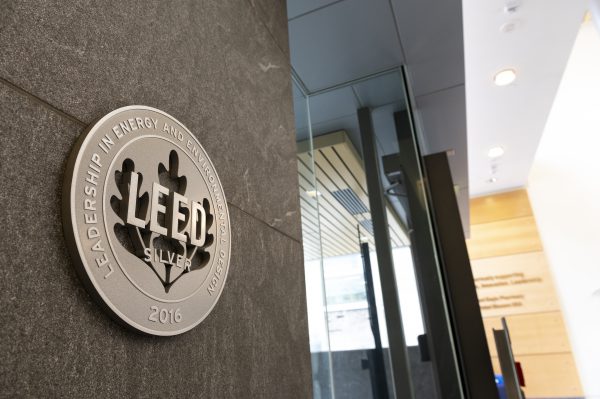Greensburg Campus

The University of Pittsburgh at Greensburg (Pitt Greensburg) stands as a beacon of academic excellence amidst the serene surroundings of western Pennsylvania. Situated within the lush greenery of the Laurel Highlands, Pitt Greensburg embraces a commitment to sustainability that harmonizes with its natural setting. The campus takes pride in its comprehensive sustainability efforts, understanding the significance of environmental preservation on both a local and global scale. Through various programs and initiatives, Pitt Greensburg actively works to minimize its environmental impact, conserve resources, and instill a culture of eco-consciousness among its community members. These endeavors not only contribute to a greener campus but also serve as educational platforms, empowering students, faculty, and staff to become stewards of the environment. Against the backdrop of the region’s rich biodiversity and scenic landscapes, Pitt Greensburg recognizes the imperative of sustainable practices in safeguarding the ecological heritage of the Laurel Highlands for generations to come.

Achievements

Green Campus

LEED Buildings
Notable Achievements in Sustainability

The University of Pittsburgh at Greensburg (Pitt Greensburg) demonstrates a steadfast commitment to sustainability through innovative initiatives that engage both its campus community and the wider public. One notable endeavor is the implementation of AbiTibi paper collection points strategically located in key campus parking lots. These collection bins cater to both Pitt-affiliated individuals and community members, providing a convenient avenue for recycling paper waste. Additionally, Pitt Greensburg facilitates telephone book recycling, further reducing paper consumption and waste. This concerted effort not only promotes environmental responsibility but also generates tangible benefits, with the program yielding an average income of $80 per term, which is then donated to the Staff Association, amounting to over $7,000 since its inception. Read more.

Pitt Greensburg partners with Westmoreland Cleanways and ShoeBoxRecycling.com to collect gently used shoes, contributing to global humanitarian efforts while diverting footwear from landfills. This initiative, launched in Fall 2012, involves placing collection boxes across campus, including in prominent locations like Cassell Hall, Chambers Hall, and the Millstein Library. The collected shoes are redistributed to various regions worldwide, including Sierra Leone, Liberia, Guatemala, and India, providing footwear to those in need. Through collaboration with local organizations and active participation from the campus community, Pitt Greensburg exemplifies its dedication to sustainability and social responsibility, making a positive impact both locally and globally.
Sustainability on Campus

Environmental Stewardship:

Pitt Greensburg’s commitment to environmental stewardship is exemplified by its efforts to maintain the natural beauty and ecological health of Slate Run Creek, which flows through the campus. Through regular testing conducted by both high school students participating in the Summer Science and Math Experience and college students in biology classes, the campus ensures that the water quality of Slate Run Creek remains pristine. This dedication to monitoring and preserving the stream’s health not only benefits the local ecosystem but also provides valuable hands-on learning opportunities for students. By fostering a habitat that supports diverse wildlife, including fish, crustaceans, amphibians, and various insects, Pitt Greensburg demonstrates its commitment to sustainability and conservation while providing an immersive learning environment for its community.
Dining Options:

The dining halls at our institution are at the forefront of sustainable dining practices. One notable strategy is the elimination of trays, a move that minimizes food waste and conserves water and other resources associated with dishwashing. Our dining halls prioritize sourcing locally grown organic food whenever possible, along with sustainable food products such as 100 percent certified seafood, cage-free shell eggs, and hormone and antibiotic-free meats. We are committed to supporting ethical and environmentally friendly food production practices, including offering Fair Trade Certified sustainable coffee on campus. Our dining facilities actively participate in sustainability programs such as Project Green Thumb recycling and composting initiatives, as well as the Trim Trax program, which tracks, measures, and reduces kitchen waste. Through these efforts, we strive to create a dining experience that not only nourishes the body but also respects and preserves the planet for future generations.
Paperless & electronic records:
The Greensburg campus of the University of Pittsburgh is committed to reducing its environmental footprint through various paperless initiatives. One notable example is the transition to electronic records, which has significantly decreased paper usage across campus. Departments such as the Office of Admissions have embraced electronic applications, streamlining the admissions process while eliminating the need for paper forms. Similarly, the Office of University Relations & Institutional Advancement has shifted towards electronic newsletters and magazines, delivering important updates and information to the campus community in an eco-friendly format. These efforts not only contribute to environmental conservation by reducing paper waste but also demonstrate the campus’s commitment to embracing technology for sustainable practices.
LEED Buildings

LEED BUILDINGS
These LEED-certified structures showcase the campus’s dedication to energy efficiency, resource conservation, and occupant well-being. Designed with sustainable features like energy-efficient lighting, water-saving fixtures, and renewable materials, these buildings serve as shining examples of environmentally responsible construction.
- Frank A Cassell Hall mearned silver-level LEED certification from the U.S. Green Building Council: https://www.upb.pitt.edu/posts/news/alexander-house-earns-silver-level-leed-status. Cassell Hall is a two-story, 16,500 square-foot building that has been designed to realize 30 percent annual energy savings and reduce water usage by 50 percent.
